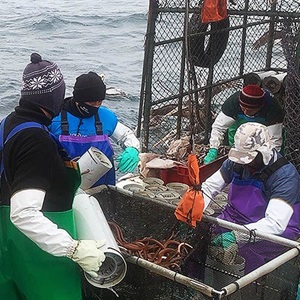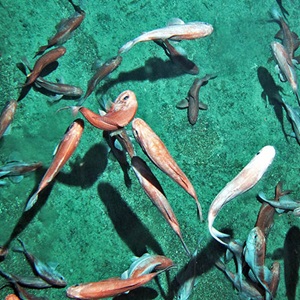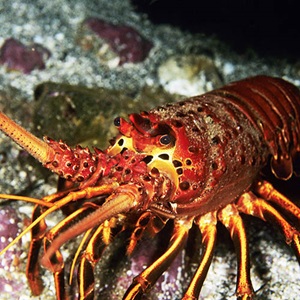A second grant for the India Kerala deep-sea shrimp trawl fishery will allow it to use new, more sustainable fishing methods and minimise impacts on stocks and the ecosystem.
- Develop a harvest strategy and harvest control rules
- Implement mitigating measures for the fishery’s impact on the marine environment
- Develop and implement the deep-sea shrimp management plan
Start date: January 2024
£49,350 GBP
Transition Assistance Fund
Awardee
WWF India
Fishery
India Kerala deep-sea shrimp trawl fishery
Progressing towards certification
The India Kerala deep-sea shrimp trawl fishery operates in the Kollam Wadge Bank area of the Arabian Sea off Kerala, on India’s southwest coast. 80% of Keralan deep-sea shrimp are caught in these waters, where the fishery harvests Arabian red shrimp (Aristeus alcocki), deep-sea caridean shrimp (Heterocarpus chani) and Indian nylon shrimp (Heterocarpus woodmasoni), mainly for export to markets in the US and EU.
The fishery has been in a Fishery Improvement Project (FIP), led by the Seafood Exporters Association, since 2019. In 2021 it began working with WWF India when it was officially verified as part of the In-Transition to MSC Program and was granted its first Transition Assistance Fund grant.
The project operates in a region of high marine biodiversity; of the 1097 species recorded in the Indian fishery, 781 were recorded in Keralan waters between 2007 and 2016. To minimise the fishery’s impacts on this environment, the first TAF grant was used to initiate the ‘model boat’ project.
The project’s aim was to implement and train fishers in the use of a novel device – the square mesh cod-end net – to reduce bycatch. Another aspect of the project was to ensure compliance with local rules on the minimum legal size of catch. Together with increased stakeholder engagement, the fishery improved its performance on stock status, management, and reducing its impacts on Endangered, Threatened, and Protected (ETP) species and the wider environment.

“With fish stocks in decline, ecolabelling is the best tool to work on ocean sustainability. This funding will bring sustainable fisheries management and improve ecosystem health. India currently doesn't have any MSC certified fisheries, so the funding will support efforts to achieve certification for the trawl fishery and the country.”
WWF India
What the project will do
With the help of its new grant, the fishery seeks to enter assessment to the MSC Fisheries Standard in 2025. It will spend the next two years completing the tasks set out in its FIP action plan, with increased research efforts directed at further improving its sustainability performance.
The fishery is now involved in finalising reference points around stock assessments, with specific objectives for developing a robust harvest strategy and appropriate harvest control rules for all three deep-sea shrimp species. It will continue trialling the bycatch reduction methods initiated in 2021, monitoring and the reduction of its impacts on marine ETP species, habitats and ecosystems. With active participation of all stakeholders, the fishery aims to finalise the development of its management plan.
Related projects
-.tmb-thumb300.jpg?Status=Master&Culture=en&sfvrsn=a0cda56e_1)
Making Kerala’s deep-sea shrimp fishing sustainable

North Peru eel trap fishery: Improvements in practice and governance

New Zealand orange roughy: Age models and Harvest Control Rules

